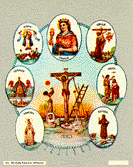
Generally, the most common manifestation of Obeah found today, although maybe not practiced on an individual basis, is blended with Orisha-worship. There are two main fractions of Orisha, Spiritual Orisha and Baptist Orisha, both of which, on the surface, carry a very heavy Christian appearance, while Obeah is said to be the remnant of a once very powerful and celebrated SECRET religious Order originally brought to the West African coast thousands of years ago from ancient African civilizations in the east. The people from the east established themselves and over time as more and more centuries passed they found themselves slowly assimilated into the local indigenous cultures --- becoming unrecognizable from their forebearers, but in the process bringing surviving segments of their religious beliefs with them -- the new culture picking and chosing, absorbing and casting off bits and pieces of the once powerful eastern beliefs, creating in their own way what has come down to us today. Baptist Orisha is a more pure and ancient line of Orisha-transmission and accepts blood-offerings, functioning very much like Orisha-worship you will find almost anywhere in the world.
There are said to be 17,000 Orisha. Orisha are spirits of nature and powerful ancestors who represent a concept or idea. Orisha are prayed to, asked to intercede, and in certain instances, actually take possession of practitioners. Chief among the Orisha are the Seven African Powers, the main Orisha we focus on in the World of Darkness.
The Seven African Powers are:
I. PAPA LEGBA:
The trickster, the opener of the way and the guardian of the crossroads, both physical and spiritual. Comparable to Hermes or Mercury in the European tradition, Legba makes the impossible possible. He lifts us beyond the limitation we impose upon ourselves in daily life. He is identified with portrayals of St. Peter and St. Nicholas. His favorite offering is candy and tobacco and coconuts. You have to ask him to carry your words to the other Orisha: he is the first one asked.
II. OBATALA:
The "old man of the mountain", responsible for the creation of our physical bodies. Literally "chief of the white cloth." Obatala's help is sought in ethical dilemmas and the problems of self-discipline. He is generally identified with the crucified Christ. Obatala is androgynous and very old: he is gentle, a sky-god, and taught the people how to do Ifa, the table divination system.
III. YEMAYA:
Literally "mother of fishes". She rules birth and the surface of the oceans, and works closely with Olokun, who rules the depths. She works through dreams and intuition. Her waves wash away all sorrow. Her compassion nurtures her children through any spiritual or emotional crisis. Her love sustains life. She is identified with Mary, Star of the Sea.
IV. OSHUN:
The Goddess of love and abundance. The power of desire is hers, and she often uses s this power to transform. She is beauty, laughter, and generosity. The erotic is her sacrament. She is often compared to Aphrodite, and is identified with the portrayal of Our Lady of Caridad. Oshun likes to heal hurt with love, and plants seeds of change in people.
V. OYA:
A revolution in constant progress, Oya brings sudden change. She is a whirlwind, an amazon, a huntress, and a wild buffalo. Lightning and rainbows are signs of her presence. She also rules communication between the living and the dead. Think of Hecate or Artemis. She is identified with St. Catherine and St. Theresa.
VI. CHANGO:
Chango is a king, and his name is synonymous with justice. He lived in historical times and ruled as the fourth Alafin (or chieftain) of Oyo, a city in modern-day Nigeria. He is a knight in shining armor. He uses lightning and thunder to enhance the fertility of the earth and of his followers. Myths concerning his death (or rather the fact that it did not occur) link him to the European figure of the Hanged God. He is identified with representations of St. Barbara.
VII. OGOUN:
God of iron and machines, Ogoun is a smith, a soldier, and a politician. In modern times he has come to be known as the patron of truck drivers. He is the spirit of the frontier, cutting paths, through the wilderness with his ever-present machete. Although Ogoun clears the way for civilization, he often prefers to dwell alone in the wilderness. He is identified with St. Anthony.
THE WORD OBEAH: What Does It Mean, How Does It Work?
POWER OF THE SHAMAN
(please click)
SOURCE:
"A NATURAL WEALTH: The Gods of the African Diaspora"
Gnosis, issue 28 (Summer 1993), by Nisi Shawl